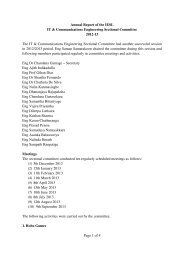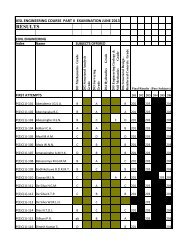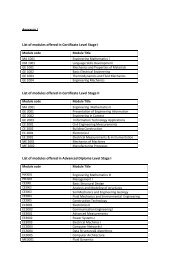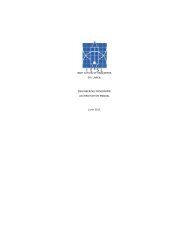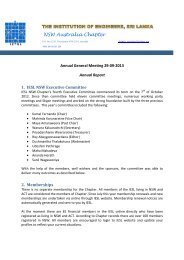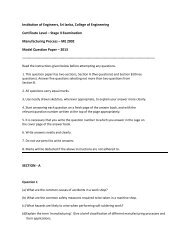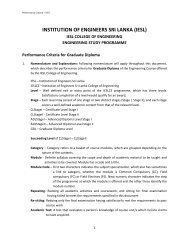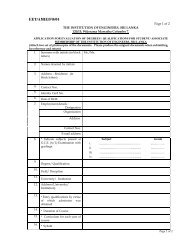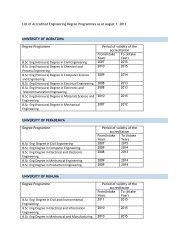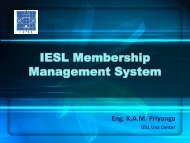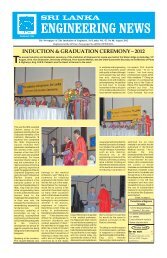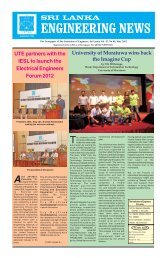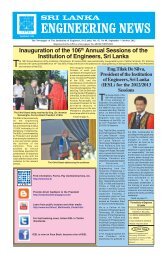Download - IESL
Download - IESL
Download - IESL
Create successful ePaper yourself
Turn your PDF publications into a flip-book with our unique Google optimized e-Paper software.
Sri Lanka Engineering News - January 2012<br />
Contd. from page 7....<br />
WHAT CAUSES....<br />
Buddhists we should pay<br />
more attention to be<br />
exemplary in respect of more<br />
basic human qualities and<br />
ethics which we could be<br />
proud of ourselves, if they<br />
properly observed.<br />
During impromptu<br />
discussions with many of<br />
fellow countrymen who have<br />
either left Sri Lanka or having<br />
intentions of leaving Sri Lanka<br />
in the near future for personal<br />
gains have expressed and<br />
argued with me that Sri Lanka<br />
is not a favorable country to<br />
live in as they do not have right<br />
opportunities and recognition<br />
to cater to their qualifications<br />
and likes. The most critical<br />
factor they pinpoint is that our<br />
country is corrupted and does<br />
not offer any environment<br />
conducive to serve. They are<br />
ever ready to complain about<br />
corruptions and the<br />
breakdowns in the systems<br />
prevailing everywhere in the<br />
country. They keep on<br />
boasting about the goodness<br />
and perfections of the<br />
systems in the countries they<br />
are either living in at present<br />
or planning to go to in the near<br />
future. This is really frustrating,<br />
as they tend to live on other<br />
people’s achievements and<br />
paradises while not<br />
contributing their skills and<br />
talents to the environment in<br />
which they were educated and<br />
brought in. The fact remains<br />
is that they find it hard and do<br />
not want to go an extra<br />
mileage in trying to organize<br />
themselves and the<br />
community around<br />
productively. It may be that they<br />
feel inferior to deal and<br />
negotiate with our own<br />
people. Instead, they opt to put<br />
the blame on others and try to<br />
get away. As a matter of fact,<br />
many people do not<br />
appreciate the facilities and<br />
the freedom which we as<br />
citizens in this country are<br />
enjoying comparatively in our<br />
region.<br />
One could also argue at this<br />
stage, then as to why Sri<br />
Lankan have behaved and<br />
reacted quite differently in the<br />
face of the Ealaam War and<br />
also when tsunami struck our<br />
soil in 2004. The fact remains<br />
that there were lot of common<br />
reasons conducive for us to be<br />
united and act as a unified<br />
force on both occasions. The<br />
case with our nation is that<br />
when it comes to general day<br />
to day duties, personal<br />
interests prevail over most<br />
important national issues. It is<br />
quite natural that we all tend<br />
to be somewhat selfish in<br />
general, as human beings.<br />
Nevertheless, there should be<br />
certain general ethics which<br />
we all should adhere and<br />
respect as general citizens of<br />
any country when they treat<br />
National Interests and Duties.<br />
This is based on what I<br />
believe and have been guided<br />
by those whom we respect as<br />
National Leaders who have<br />
shown us exemplary paths to<br />
follow in the past<br />
Let me now elaborate on what<br />
made us to act quite differently<br />
during the 30 year Ealaam<br />
War. As we all know, Sri Lanka<br />
has been severely battered<br />
and devastated continuously<br />
through out the Ealaam War<br />
which lasted for almost three<br />
decades. Most Sri Lankans<br />
have suffered or grieved<br />
directly or indirectly, during<br />
this horrified period. Those<br />
who left home in the<br />
mornings could not<br />
guarantee that they could<br />
come back home in the<br />
evenings. People were<br />
forced to undergo untold<br />
hardships economically as<br />
well as socially. These<br />
miseries which the country<br />
had to face, really forced<br />
people to get together and<br />
unite to fight and eliminate<br />
this common enemy. It is this<br />
unique situation which<br />
helped us to leave our<br />
natural selfishness aside for<br />
the sake of national<br />
interests.<br />
Sri Lanka which was hit by<br />
the tsunami in December,<br />
2004, had to face untold<br />
miseries and take heavy toll<br />
on its economy during the<br />
recovery period. The country<br />
as a whole had neither<br />
experienced nor really<br />
visualized the<br />
horrendousness of a<br />
tsunami disaster before. We<br />
were caught completely<br />
unaware of the event on that<br />
very fateful day. The whole<br />
nation rose together to help<br />
each other and rescue those<br />
who suffered from this<br />
mammoth devastation<br />
unprecedented in the recent<br />
history of Sri Lanka.<br />
Everybody displaying unique<br />
human qualities came<br />
forward to help each other<br />
under trying conditions. Again<br />
this event had common<br />
reasons for most of the<br />
people to unite and act<br />
together. Both these events<br />
brought drastic impacts on<br />
our economy in series.<br />
However, I still do not see that<br />
the average Sri Lankan<br />
would have behaved in the<br />
same patriotic manner under<br />
normal circumstances.<br />
What are the causes for<br />
these indifferent behaviors<br />
and incorrigible attitudes?<br />
What steps could we take to<br />
improve and reform our<br />
society in this respect? Who<br />
should take the leading role<br />
in guiding and reorienting our<br />
society to be more<br />
responsible and disciplined<br />
in every respect? Have we, as<br />
the public, got any role to play<br />
in driving our kith and kin to<br />
be exemplary citizens in our<br />
country? How best could we<br />
address these issues?<br />
These are the pertinent<br />
questions which come to my<br />
mind immediately.<br />
I still remember the days<br />
when Sri Lanka was going<br />
through a closed economy<br />
during the 70s with<br />
emphasis being given to<br />
import substitution policies<br />
due to shortage of foreign<br />
exchange, world wide food<br />
scarcity and spiraling of oil<br />
prices. The Sri Lankan<br />
Government quite correctly<br />
rose to the occasion and<br />
curtailed imports and<br />
stepped up agriculture<br />
production in the country to<br />
its maximum. Lot of<br />
unpopular restrictions and<br />
regulations had to be<br />
introduced in the midst of<br />
heavy criticism by a minority<br />
‘super’ class who were not<br />
prepared to sacrifice some<br />
luxuries to achieve common<br />
goals in the interest of the<br />
nation. The country was<br />
producing most of its basic<br />
commodities at that time.<br />
Although the quality of the<br />
products had not reached<br />
that of foreign goods, yet<br />
people were content with<br />
what was available under the<br />
circumstances. Regardless<br />
of heavy criticisms by a<br />
handful of politicians, the<br />
country managed somehow<br />
to survive and overcome the<br />
economic obstacles to the<br />
best of its ability. The<br />
reasons for the success and<br />
complacency could be<br />
attributed to the national<br />
feelings people had in<br />
common at that time. The<br />
people who were patriotic<br />
and national minded in the<br />
beginning were somewhat<br />
carried away by the political<br />
slogans in the latter stages.<br />
Nevertheless, the<br />
background which led to the<br />
fall of the government in 1977<br />
is a much more complex and<br />
well orchestrated plan than<br />
what we would have thought<br />
at a glance. It is not my<br />
intention however to<br />
elaborate on the issues<br />
which led to the change of<br />
government at that time.<br />
However, there is a school<br />
of thought prevailing now that<br />
we would have been better<br />
off had we continued in a<br />
much more balanced and<br />
indigenous economic<br />
system than making it fully<br />
liberalized as it was done<br />
then.<br />
With the change of<br />
government in 1977, the<br />
country was exposed to full<br />
scale open economy as<br />
enjoyed by most of the much<br />
affluent countries in the west<br />
at that time. All the<br />
restrictions which were in<br />
place before were removed<br />
and then people were<br />
allowed to import what ever<br />
they fancied and could afford<br />
to sell in the open market.<br />
The television media was<br />
too introduced and followed<br />
by the lifting and relaxation<br />
of rules of the National<br />
Performance Censorship<br />
Act, pertaining to screening<br />
of films, sales of printed<br />
materials and newspapers<br />
etc. New liberal moves and<br />
policies were introduced in<br />
respect of newly emerging<br />
TV and Radio channels. The<br />
curriculum for the education<br />
too was subject to an overall<br />
reform in the context of<br />
changing trends in the<br />
country. The subjects like<br />
Geography, History,<br />
Literature and Civics were<br />
removed and replaced with<br />
one general subject called<br />
Social Studies. The students<br />
were gradually distanced<br />
from the opportunities that<br />
were available for them to<br />
study and familiarize<br />
themselves with the<br />
ideologies and life stories of<br />
our national leaders who<br />
had guided and motivated us<br />
in the past. The access to<br />
study literature and make<br />
them to appreciate good<br />
literary works of poets and<br />
renowned writers in the class<br />
room itself was changed and<br />
removed. The students were<br />
directed to confine themselves<br />
to class notes and handful of<br />
textbooks only. The good reading<br />
habits of children thus began to<br />
disappear leaving us with a<br />
young generation with limited all<br />
round knowledge and degraded<br />
human qualities. The new<br />
generation was oriented to be<br />
more and more competitive and<br />
self oriented so far as to get<br />
through their exams only. The<br />
urge to maintain the inter-family<br />
relationships and neighborhood<br />
connections started to erode<br />
away in view of limitation of time<br />
available for social events.<br />
Another very important factor<br />
which has contributed to the<br />
denudation of inter-family and the<br />
neighborhood relationships is<br />
the campaign introduced by the<br />
government in office in the 80s<br />
to encourage people to cut down<br />
the numbers in each family to 3<br />
or less as a step towards<br />
reducing population growth. The<br />
family bonds that were created<br />
and maintained through out<br />
generations too were affected<br />
due to reduction of family size<br />
and changing values of the<br />
environment. The introduction of<br />
TV, TV Games and the Internet<br />
has had drastic impacts to our<br />
culture and family styles. All these<br />
factors have attributed to the<br />
sorry state of our cultural values<br />
and attitudes. It is my firm view<br />
that we as a country should have<br />
been more careful and prepared<br />
before opening these new<br />
windows to the modern world.<br />
The country as a whole could not<br />
sustain the sudden flooding and<br />
inflow of erratic global<br />
information and influence. The<br />
overall impact has been more<br />
harmful than useful to our society<br />
in general. The same could be<br />
said about the relaxation of the<br />
controls in the economy to allow<br />
imports to flood our market with<br />
everything with no<br />
considerations given to our local<br />
manufacturers and growers. It is<br />
very interesting to observe that<br />
these kinds of fully liberalized<br />
policies are not implemented<br />
without any protection to local<br />
industries and growers even in<br />
countries from where we have<br />
borrowed them.<br />
We as general citizens should<br />
recognize the importance of<br />
identifying the evils and<br />
weaknesses in our society and<br />
make a concerted effort to<br />
contribute in whatever manner<br />
we could in order to improve and<br />
remove the roots and causes<br />
affecting ourselves. It is our<br />
utmost responsibility to direct,<br />
guide and advice our children to<br />
be more responsible and dutiful<br />
citizens by making a start at<br />
home itself. Give every support<br />
and encouragement for them to<br />
get back in to the habits of<br />
reading books on other subjects<br />
other than what they study at the<br />
school. As parents we have to be<br />
exemplary and advise our<br />
children how they should mould<br />
their life to be dutiful and<br />
righteous in the society. Provide<br />
every support and facility to<br />
engage your kids in extracurricular<br />
activities. The<br />
importance of them involving in<br />
dramas, literary activities, and<br />
also sports should be<br />
emphasized. Engaging in sports<br />
will enable them to experience<br />
<strong>IESL</strong> NEWS<br />
11<br />
team work and interact with<br />
each other, whilst facing victory<br />
as well as defeat in life in the<br />
same spirit.<br />
The education curriculum has<br />
to be so designed to cater to<br />
such needs of the society. This<br />
exercise may have to be<br />
extended to even the Nursery<br />
Education prevailing in the<br />
country which I suspect could<br />
be an impediment to our<br />
society. Perhaps, designing<br />
and introducing new subjects<br />
in to the curriculum will help<br />
to inculcate patriotism and<br />
dutifulness in the minds of<br />
younger generation. It is very<br />
important that the Sri Lankan<br />
citizens are unified and<br />
brought under one nation to<br />
think and react with no<br />
division in terms of cast, race<br />
or religion. The temples and<br />
all religious places in the<br />
country have a more<br />
responsible role to play to<br />
influence and advice the<br />
children and the adults in the<br />
right direction. The unity and<br />
harmony among the multi<br />
ethnic groups in the country<br />
will act as a valuable asset for<br />
achieving the prosperity of the<br />
nation in the future. The priority<br />
and emphasis given at<br />
present for Sinhalese and<br />
Tamil as a second language<br />
for all government servants is<br />
a very progressive step taken<br />
by the government to promote<br />
and develop the mutual<br />
understanding between the<br />
multi-ethnic groups in the<br />
country. Strengthening of<br />
English Education at schools<br />
as an International Language<br />
is also equally important to<br />
bridge any gaps prevailing in<br />
the society in terms of<br />
communication.<br />
One more very important and<br />
critical area which has to be<br />
addressed in this respect is<br />
appointment of a Presidential<br />
Commission to examine the<br />
causes for these weaknesses<br />
and recommend to the<br />
government as to what<br />
actions taken in Education<br />
and Multi-media to promote<br />
and raise the younger<br />
generation to be more<br />
responsible, dutiful and<br />
patriotic towards the society.<br />
This commission obviously<br />
has to comprise of learned<br />
representatives from all<br />
religions, educationists,<br />
sociologists and legislators.<br />
It is proposed that the<br />
recommendations which<br />
come out of this be carefully<br />
studied and deliberated by the<br />
government immediately and<br />
action taken to implement<br />
whatever steps that should be<br />
taken treating this as a<br />
national priority of the highest<br />
level.<br />
It is a common view that<br />
politicians in Sri Lanka set bad<br />
examples to the society. My<br />
personal view is that we<br />
should be blamed for electing<br />
wrong representatives to the<br />
Parliament in the first place.<br />
Secondly, I think that once the<br />
society is reformed and<br />
rehabilitated to produce good<br />
and dutiful citizens naturally<br />
we would get a new breed of<br />
righteous and honest<br />
politicians too. For that, we all<br />
will have to act together and<br />
be patient for a dream nation<br />
to evolve.<br />
16th December 2011



